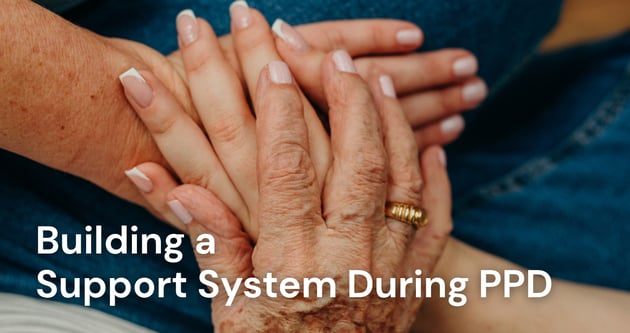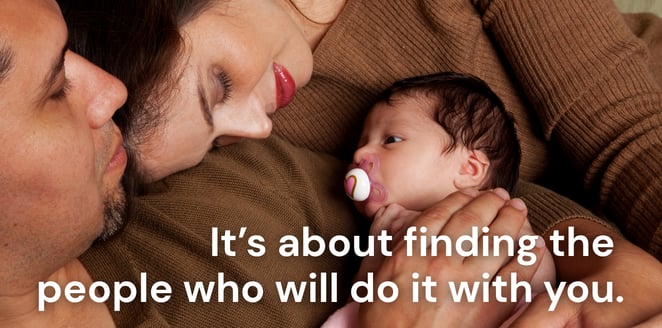How to Build a Support System During PPD
7/2/20254 min read
Postpartum depression (PPD) can feel like an emotional vacuum. The joy and anticipation once imagined often give way to numbness, exhaustion, and a gnawing sense of isolation. One of the cruelest tricks of PPD is that just when a mother most needs support, she feels least able to ask for it.
Whether it's because of shame, guilt, or sheer exhaustion, building a support system during PPD can seem impossible. But here's the truth: you don’t need to do this alone and you were never meant to.
At Peace Temple, we’ve helped hundreds of mothers move from silent suffering to supported healing. And while every mother’s story is unique, one element always accelerates recovery: connection.
In this article, we’ll explore how to build a support system that meets your emotional, physical, and mental needs—no matter where you’re starting from.


Why Support Is Essential in PPD Recovery
Postpartum depression is not simply about feeling “sad.” It affects how you think, function, bond, and believe in your capacity to cope. Without support, these symptoms can deepen into self-isolation, intrusive thoughts, and even suicidal ideation.
A strong support system can:
Reduce feelings of loneliness and shame
Offer breaks and practical help
Encourage you to seek professional treatment
Create space for emotional release and validation
Improve outcomes for both mother and baby
Connection isn’t just comforting - it’s biologically regulating. Being around safe, responsive people can help your nervous system recalibrate and your brain begin to heal.
Step 1: Identify the Types of Support You Need
A common barrier to building support is not knowing what to ask for. Begin by breaking support into three categories:
1. Emotional Support
People who can listen without judgment, validate your feelings, and help you feel less alone. This may include:
A partner or trusted friend
A therapist or counsellor
Peer support from other mothers
2. Practical Support
Help with daily tasks so you can rest, heal, or just catch your breath. This might include:
Meals or grocery delivery
Household chores or childcare help
Rides to appointments
3. Professional Support
Qualified providers who can diagnose and treat PPD, such as:
Mental health professionals (therapists, psychiatrists)
OB-GYNs or primary care physicians
Lactation consultants, doulas, or postpartum coaches
At Peace Temple, we guide mothers through all three levels helping them map out who can offer what, and where new connections might need to be made.
Step 2: Start With What You Already Have
You don’t need to create an entire village overnight. Begin with your existing network, even if it feels small.
Ask yourself:
Who would answer if I texted, “Can I talk?”
Who has offered help, but I haven’t accepted?
Who makes me feel emotionally safe - even if we’re not close?
Once you identify even one or two people, consider reaching out with a gentle truth:
“I’ve been struggling and could really use someone to talk to. Can we check in this week?”
This doesn’t have to lead to a deep disclosure - just a step toward connection.


Step 3: Make Specific Asks
People want to help but they often don’t know how. Instead of saying, “I’m overwhelmed,” try:
“Can you come hold the baby while I nap?”
“Would you mind dropping off dinner next week?”
“Can you come with me to my therapy appointment?”
Clear, specific requests help others respond in ways that are truly helpful. This turns vague support into concrete relief.
If verbalizing feels too hard, consider writing it down or texting. At Peace Temple, we help mothers script these messages, making the process less intimidating.
Step 4: Join a Safe Peer Support Group
Sometimes, the most healing thing is simply hearing: “Me too.”
Support groups offer:
Shared experience without judgment
Emotional validation from others who understand
Coping strategies you might not have considered
Look for:
Therapist-led postpartum support groups
Online communities with respectful moderation
Local meet-ups for new moms (some virtual, some in person)
Peace Temple’s support circles are designed for mothers with PPD and anxiety—spaces where honesty is honored and recovery is gently nurtured.
Step 5: Lean on Professionals—You Deserve Real Help
If symptoms of PPD persist or worsen, it’s time to seek clinical support. You don’t need a diagnosis to justify reaching out. If something feels off, trust your instinct.
Professional care might include:
Therapy (CBT, interpersonal therapy, or trauma-informed modalities)
Medication, when appropriate and safe for your situation
Combined care, including therapy and postpartum-focused wellness coaching
At Peace Temple, our team specializes in perinatal mental health. We understand the nuances of hormonal shifts, intrusive thoughts, and the grief many parents feel after birth.
Seeking help isn’t a sign of failure. It’s a declaration of worthiness.
Step 6: Include Your Partner (If Applicable)
If you have a partner, they can be a vital part of your support system—if they’re informed. Many partners want to help but:
Misunderstand what PPD is
Take withdrawal or sadness personally
Don’t know what to say or do
Open up a dialogue by saying:
“I’m struggling more than I expected, and I want to share this with you. Can we learn about PPD together?”
Partners can also join therapy sessions, handle night time duties, or act as advocates when you’re too tired to speak up.
Peace Temple offers couple-focused support so both parents feel equipped and emotionally safe during this transition.
Step 7: Be Gentle With Yourself as You Build
Building a support system during PPD is not a quick fix. It’s a process of reaching out, receiving, and releasing the idea that you have to “handle everything.”
There may be days you’re too tired to make a call or respond to a text. That’s okay.
There may be people who don’t show up the way you hoped. That hurts—but it doesn’t mean you’re unworthy of care.
Every time you speak your need, you’re healing. Every time you let someone in, you’re rewriting the story PPD tries to tell that you’re alone, broken, or invisible.
Final Thoughts: You’re Not Meant to Heal Alone
Postpartum depression thrives in silence but healing grows in connection. Building a support system isn’t about being social or strong. It’s about being seen, even in your most vulnerable state.
You deserve to be held - emotionally, practically, professionally.
At Peace Temple, we help you map out support not just for survival but for recovery, rest, and joy that doesn’t feel forced.
This isn’t about “doing it all.” It’s about finding the people who will do it with you.
